The unusual death of Colin Marr
 Margaret Graham
Margaret GrahamColin Marr died in 2007 from a single blow from a kitchen knife after a row with his fiancée Candice Bonar about his alleged infidelity.
Candice and the police said he took his own life, but the case was later reopened after a challenge from Colin's family.
Ten years on from an inconclusive fatal accident inquiry into the 23-year-old's death, his family claim questions still remain for the police and prosecution service.

The bright blue glow of the ambulance light was bouncing off the grey harling houses as Margaret Graham turned into Colin's street.
Margaret was going to her son's flat in the former mining town of Lochgelly in Fife for dinner. She was due to fly back to her home in California the next day.
"My heart was racing as obviously something serious had happened," she says.
"I ran towards the house and was stopped by a policewoman keeping everyone back.
"I saw his fiancée shouting out that Colin had stabbed himself. I could not believe it."
Just 30 yards from where Margaret was standing, Colin Marr was lying dead on his living room floor with a kitchen knife through his heart.
A hysterical Candice told neighbours who tried in vain to save Colin that he had killed himself. The local police quickly came to the same verdict.
But how that conclusion was reached is still being questioned nearly 14 years later.
A series of police and prosecution service probes into the original investigation, as well as a Fatal Accident Inquiry (FAI), have raised more questions than answers for Colin's family - who have never accepted he took his own life.
His mum Margaret and stepdad Stuart Graham have led the family's charge in trying to get to the bottom of what went wrong, hiring their own private detective and pathology experts to do the job which they claim the authorities have failed to do.
The row
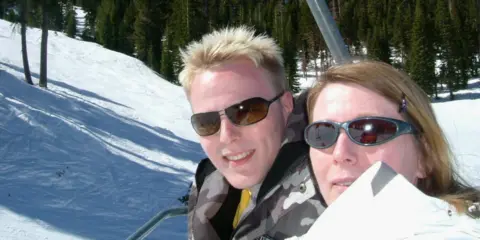 Margaret Graham
Margaret GrahamA "loveable and sociable young man" is how Margaret describes her son Colin, who worked as a mortgage adviser.
The pair were close. Margaret was visiting from her new home in the US, and they had seen each other most days in the period leading up to his death.
Watching his beloved Dunfermline Athletic football team and going to gigs and clubs were the mainstay of Colin's life.
He had met Candice when they both worked in a branch of McDonald's as teenagers and they lived together for a year before the 23-year-old's death.
The pair were engaged, but Colin's family said the relationship had been unravelling for some time.
This was played out in painful detail at the FAI. It heard how Colin's alleged infidelity had left the relationship hanging by a thread, with Candice moving back to her parent's house.
The inquiry was told that on 10 July 2007, Candice told a friend she was going to see Colin that evening to sort things out.
Candice got to the flat at some time between 19:22 and 20:02.
A call from Colin to his mum to check she was still coming for dinner was timed at 19:53. He didn't mention that Candice was there.
At 20:02 Candice phoned a friend who said she'd been told by another friend that news of Colin's affair was true. That call lasted just under four minutes.
Candice told the FAI that she then had a row with Colin which resulted in her throwing her engagement ring to the floor and telling him the relationship was over.
She said Colin gripped her arms and tried to stop her leaving, and she hit him with her handbag.
As she searched for her trainers to put on and leave, Candice said she heard banging from the kitchen and, in a statement to the police, said Colin had shouted: "I'll kill myself if you leave me, I've got nothing to live for".
Candice said she came back into the living room where Colin told her he'd stabbed himself and was clasping his hands over his abdomen before he collapsed.
A knife from the kitchen was on the carpet close to where he died.
'This was obviously a suspicious death'
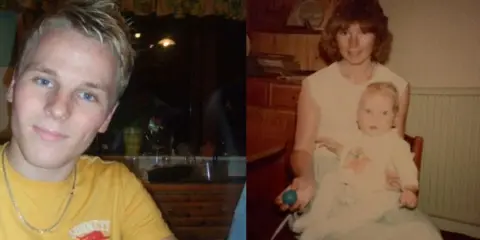 Margaret Graham
Margaret GrahamThe Fife Police detectives in charge of the investigation were quickly set on a course that the death was most likely suicide.
This meant there was no forensic, fingerprint or pathology expert attendance at the scene on the night.
Local prosecutors backed Fife Police's approach to not treat Colin's death as suspicious and the family didn't challenge this - at first.
"There were a few red flags that showed that this was not 'open and shut suicide' - or at least how could they know this when many questions and lines of inquiry were not done?" explains Margaret.
"I was told the police would come and speak to me, but nobody came to see me until after Colin's funeral."
A private detective was hired by the family and the first issue he raised was that this type of suicide was "very hard to do and highly unlikely", says Margaret.
Retired detective Tony Whittle, former head of major crime for West Yorkshire Police, has been helping Colin's family since 2012.
Mr Whittle told BBC Scotland the fact that the police accepted the explanation of suicide "without question" was "very difficult to understand".
He added: "I found this case shocking. From the outset, this was obviously a suspicious death.
"There is a 'golden rule' that all suspicious deaths should be treated as potential murders until the evidence shows otherwise. Any competent detective would know this."
The fault lines in the original investigation were first exposed when Colin's family won their fight for a fatal accident inquiry into his death.
Scotland's FAI system determines the cause of death and does not apportion blame.
At the conclusion of the inquiry in April 2011, Sheriff Dunlop said there was "insufficient evidential basis to allow me to say that one explanation for the fatal wound is any more likely than the other".
By this point Fife Police and the Crown Office - Scotland's prosecution service - had both produced reports which were critical of the original investigation and issued apologies to Colin's family.
In addition, the Police Investigations and Review Commissioner later upheld 12 complaints over the force's handling of the case - including not meeting with Colin's family to take statements until after his body was cremated.
Retired Det Supt David Swindle, in a review for the Crown Office, ruled the death was suspicious and said it was "frustrating to understand why such basic and serious failings took place".
Mr Swindle's report resulted in yet another review in 2012, this time to be led by the cold case review team at Strathclyde Police.
Colin's family had felt that every official review until this point had fallen short but were hopeful that their unanswered questions would now be addressed.
The stab wound
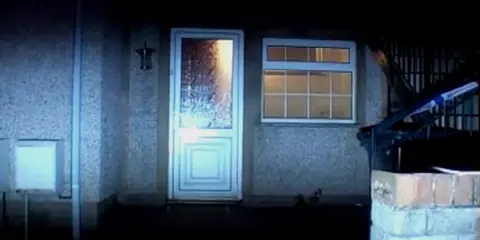 Fife Police
Fife PoliceThe original post-mortem report recorded that the kitchen knife passed through the bone of Colin's sternum.
All of the pathology experts who gave evidence at the FAI agreed that "considerable force" would be required to inflict such an injury, and that it was possible it was self inflicted (though one regarded this as "highly unlikely").
The location of the fatal wound was perhaps the simplest part of a complicated puzzle.
That was until the 2012 Strathclyde Police review commissioned the Centre for Anatomy and Human Identification at Dundee University to look at the case.
This review, shared with Colin's family, suggested that its best estimate was "the blade most likely entered the chest plate to the right of the border of the body of the sternum".
This significance of this is that "the degree of force would be markedly reduced if the blade passed through the soft tissues rather than through the bone of the sternum".
"Finally, we'd got what we asked for - an independent investigation by Strathclyde," says Colin's stepdad Stuart.
"The problem is that they bring in a new forensic expert who delivers a report which is in direct conflict with seven pathologists and two paramedics.
"Suddenly we move from a fairly clear position of Colin being stabbed through the sternum to him actually being stabbed through soft tissue."
The development deeply troubled Colin's family and they asked Dr Nat Cary, one of the UK's leading pathologist and an expert witness in the trial of Soham murderer Ian Huntley, to look at the case.
Dr Cary rejected the Dundee University findings - suggesting the wounds they based their findings on were made during the autopsy dissection - and concluded that the stab wound "penetrated the sternum and would have required severe force".
Like the other pathology experts who have looked at this case, Dr Cary said it was possible Colin could have reached the location where he was stabbed.
But he said it would be "unusual for a self-inflicted wound to pass through a bony structure".
He added: "In my opinion it is both possible and plausible that this was a stab wound inflicted by a third party.
"Forensic pathology is not capable of making an absolute distinction. However, this case should have been and should continue to be pursued as a case of potential homicide."
The dumbbell
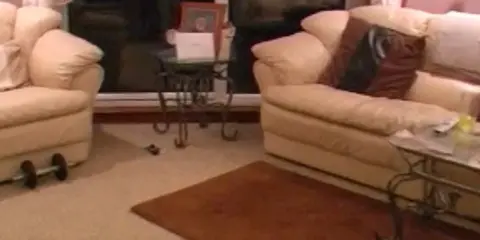 Fife Police
Fife PoliceOne of the other issues raised by Dr Cary are the marks found on Colin's forehead.
In her statements to the police and the FAI, Candice said she hit Colin with her handbag during their row. The original post-mortem examination identified "recent trivial abrasions" to his forehead with "no underlying bruising or deeper injury".
However, Dr Cary's report warns the marks do "not appear to have been considered in relation to the possible circumstances leading up to death".
The pathologist points out that in the police photographs of the aftermath at Colin's flat there is a dumbbell with a threaded bar, and Dr Cary's report states there's a "real possibility" that the abrasion on Colin's forehead could have been caused by the dumbbell.
He added: "If the deceased had been struck by the dumbbell and rendered unconscious or semi-conscious on the floor, then it is easy to imagine the subsequent infliction of a penetrating stab wound of the kind present in this case."
Dr Cary said that if an impact injury like this was closely followed by a stabbing and loss of circulation, then very little bruising would be expected and it "would be quite wrong to dismiss this injury as necessarily trivial".
The dumbbell was not forensically examined or retained as a police production after Colin's death. His stepdad, Stuart Graham, says it was later removed from the flat by Candice's family when they collected her belongings.
'We have been let down'
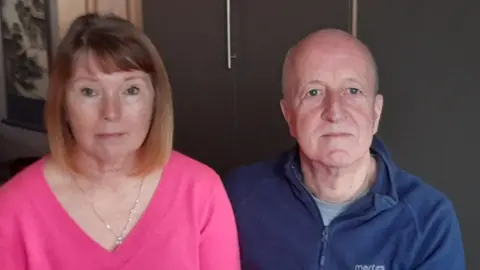 Margaret Graham
Margaret GrahamCandice Bonar, who has been interviewed three times by the police since Colin's death and voluntarily appeared in person at the FAI, has always maintained her innocence in the face of Colin's family's campaign to get his death reinvestigated.
In his 2011 inquiry verdict, Sheriff Dunlop said there were "inconsistencies in her various accounts" of Colin's death but that "these do not point convincingly to any lack of truthfulness on her part".
Following the FAI, Miss Bonar issued a statement where she said: "My name is cleared. I have always been honest and declared my innocence throughout this heart-breaking nightmare.
"What Colin did, he did to himself and that's the truth."
It is a statement Colin's family will never accept until there has been another independent probe into what happened on 10 July 2007.
Margaret says she feels let down by "the very people I have been brought up to respect and trust".
Stuart has lost faith in Scotland's justice system and claims that inconsistencies in the timeline on the night of Colin's death, and reports that a third person may have been present, have never been properly investigated.
"They just want us to go away quietly," he says.
"We have worked tirelessly with the Crown Office but have come to the conclusion we are being played.
"The fundamental problem that exists is that the Crown and police failed to deliver an independent investigation into Colin's death after it was clear that Fife Police and the fiscal's office had made serious errors."
Colin's family have now sent a letter to the Lord Advocate calling for a criminal investigation into the actions of Fife Police and local prosecutors in the wake of Colin's death.
The family are also calling for a fresh investigation into the 23-year-old's death to be undertaken by a police force outside of Scotland.
A Crown Office spokesman said: "Numerous independent experts have considered the pathology evidence on behalf of the Crown... and their conclusions were accepted by the presiding sheriff at a FAI.
"The Crown Office and Procurator Fiscal Service also addressed the family's concerns regarding some evidence at a meeting in 2015.
"We will be happy to consider any new material relevant to the death of Colin Marr."
Det Ch Sup Laura Thomson, who oversees homicide and governance review of Police Scotland, said: "Our sympathies remain with Colin's family and we acknowledge the severe impact his death and the subsequent inquiries have had on them.
"Strathclyde Police undertook an independent investigation and learning opportunities were identified from the initial investigation, which were accepted by Fife Constabulary.
"Any new information which may be received about Colin's death will be assessed and acted upon, as appropriate."
- If you or someone you know is struggling with issues raised by this story, you can find support through BBC Action Line.
